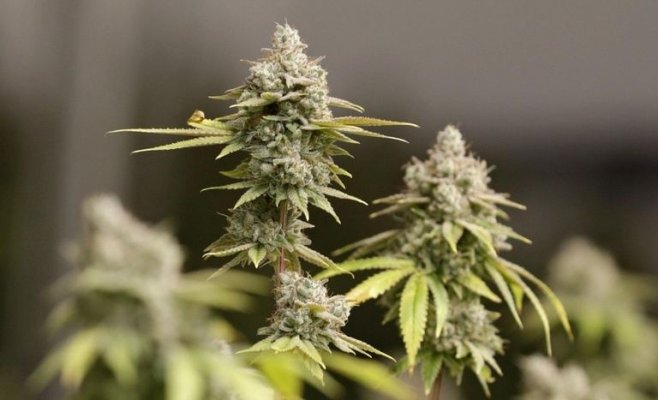Cannabis activists have started private medical marijuana groups outside the state’s medical marijuana program, citing quirks in Ohio law. But legal experts are skeptical of their justifications.
Private groups that aren’t licensed through Ohio’s medical marijuana control program are testing state marijuana laws.
The groups say they’re providing an outlet for patients who don’t trust state regulators or marijuana companies. While organizers say they are on solid legal footing, some legal experts are unconvinced.
Chad Thompson runs the private cannabis organization Urban Plant Wellness, based in Toledo. The group provides dues-paying members with medicinal marijuana, but Thompson declined to answer detailed questions about its operation.
Lee Hughes, who runs a Columbus-based private cannabis organization called FireGro Organic Farms, was more upfront. He said his group grows marijuana for its members.
Hughes said his marijuana is organic and better quality than cannabis available in dispensaries. (Mainstream Ohio medical marijuana companies have consistently defended the quality of their products, pointing to the state’s rigorous testing standards.)
Hughes and Thompson declined to reveal any membership information, citing privacy concerns. Thompson’s organization has a storefront in Toledo and appears on online dispensary lists.
Thompson started his group to address complaints about the state’s regulatory regime.
“We feel we are more knowledgeable than the state,” he said, citing the State Medical Board of Ohio’s decision not to add conditions including opiate addiction to the list of ailments that patients can cite to obtain medical marijuana.
A number of patients have told the board that marijuana helped them get off painkillers. But medical experts recommended against approval, citing a lack of rigorous research.
State officials said they are considering the legality of private cannabis groups.
“If the entity is dispensing medical marijuana, that is prohibited,” Ali Simon, public and policy affairs liaison for the State of Ohio Board of Pharmacy, said in an email. “If the entity is a private club where those in lawful possession can use, that is not prohibited.”
Private groups such as the Veterans of Foreign Wars can sell alcohol without the same restrictions as bars. Thompson said Urban Plant Wellness works the same way.
He cites a legal synopsis written by the ProAdvocate Group PMA — a Texas-based legal organization — that argues for the rights of private membership associations. The synopsis quotes a series of Supreme Court rulings upholding the rights of private groups.
The court has ruled that “the general rule is that when a private membership association does not rise to the threshold level of a clear and present danger of substantive evil ... agencies may not interfere with the activities of the association,” the synopsis says.
Legal experts are skeptical.
The Ohio Revised Code specifically addresses private groups that sell liquor, said Jonathan Entin, an emeritus law professor at Case Western Reserve University.
That suggests state legislators “know how to set up an arrangement for private clubs,” Entin said. “I think you can infer the absence of a similar provision for marijuana means that exception isn’t there.”
The ProAdvocate Group document selectively quotes Supreme Court decisions regarding freedom of speech and assembly without appropriate context, said Doug Berman, an Ohio State University law professor.
“If the group was convening to strategize on how they will advocate for marijuana reform, that would be protected,” Berman said.
ProAdvocate’s argument suggests that private groups aren’t subject to generally applicable laws, Entin said. “And I very much doubt that any court would take that argument seriously.”
A ProAdvocate representative did not respond to a message seeking comment.
Hughes justifies the legality of his group using Article 1, Section 21, of the Ohio Constitution, which says the state can’t punish anyone for buying or selling health care.
That section of the constitution was added in 2011 in response to the 2010 Affordable Care Act. Author Maurice Thompson of the Columbus-based 1851 Center for Constitutional Law said the idea was to preserve Ohioans’ freedom to choose their health care if Ohio passed a similar law.
“It’s a really interesting issue and a really interesting application,” Thompson said of Hughes’ interpretation.
Constitutional scholars in Ohio find the proposition a little more dubious.
Hughes would have convince a court “to define the distribution of any amount of marijuana as the distribution or sale of health care,” said Mike Gentithes, a professor at the University of Akron School of Law.
Article 1, Section 21, includes a grandfather clause that says it doesn’t affect any laws passed before March 18, 2010, when marijuana was still illegal for all purposes, Thompson said.
“That’s where it gets messy,” he said.
Private groups that aren’t licensed through Ohio’s medical marijuana control program are testing state marijuana laws.
The groups say they’re providing an outlet for patients who don’t trust state regulators or marijuana companies. While organizers say they are on solid legal footing, some legal experts are unconvinced.
Chad Thompson runs the private cannabis organization Urban Plant Wellness, based in Toledo. The group provides dues-paying members with medicinal marijuana, but Thompson declined to answer detailed questions about its operation.
Lee Hughes, who runs a Columbus-based private cannabis organization called FireGro Organic Farms, was more upfront. He said his group grows marijuana for its members.
Hughes said his marijuana is organic and better quality than cannabis available in dispensaries. (Mainstream Ohio medical marijuana companies have consistently defended the quality of their products, pointing to the state’s rigorous testing standards.)
Hughes and Thompson declined to reveal any membership information, citing privacy concerns. Thompson’s organization has a storefront in Toledo and appears on online dispensary lists.
Thompson started his group to address complaints about the state’s regulatory regime.
“We feel we are more knowledgeable than the state,” he said, citing the State Medical Board of Ohio’s decision not to add conditions including opiate addiction to the list of ailments that patients can cite to obtain medical marijuana.
A number of patients have told the board that marijuana helped them get off painkillers. But medical experts recommended against approval, citing a lack of rigorous research.
State officials said they are considering the legality of private cannabis groups.
“If the entity is dispensing medical marijuana, that is prohibited,” Ali Simon, public and policy affairs liaison for the State of Ohio Board of Pharmacy, said in an email. “If the entity is a private club where those in lawful possession can use, that is not prohibited.”
Private groups such as the Veterans of Foreign Wars can sell alcohol without the same restrictions as bars. Thompson said Urban Plant Wellness works the same way.
He cites a legal synopsis written by the ProAdvocate Group PMA — a Texas-based legal organization — that argues for the rights of private membership associations. The synopsis quotes a series of Supreme Court rulings upholding the rights of private groups.
The court has ruled that “the general rule is that when a private membership association does not rise to the threshold level of a clear and present danger of substantive evil ... agencies may not interfere with the activities of the association,” the synopsis says.
Legal experts are skeptical.
The Ohio Revised Code specifically addresses private groups that sell liquor, said Jonathan Entin, an emeritus law professor at Case Western Reserve University.
That suggests state legislators “know how to set up an arrangement for private clubs,” Entin said. “I think you can infer the absence of a similar provision for marijuana means that exception isn’t there.”
The ProAdvocate Group document selectively quotes Supreme Court decisions regarding freedom of speech and assembly without appropriate context, said Doug Berman, an Ohio State University law professor.
“If the group was convening to strategize on how they will advocate for marijuana reform, that would be protected,” Berman said.
ProAdvocate’s argument suggests that private groups aren’t subject to generally applicable laws, Entin said. “And I very much doubt that any court would take that argument seriously.”
A ProAdvocate representative did not respond to a message seeking comment.
Hughes justifies the legality of his group using Article 1, Section 21, of the Ohio Constitution, which says the state can’t punish anyone for buying or selling health care.
That section of the constitution was added in 2011 in response to the 2010 Affordable Care Act. Author Maurice Thompson of the Columbus-based 1851 Center for Constitutional Law said the idea was to preserve Ohioans’ freedom to choose their health care if Ohio passed a similar law.
“It’s a really interesting issue and a really interesting application,” Thompson said of Hughes’ interpretation.
Constitutional scholars in Ohio find the proposition a little more dubious.
Hughes would have convince a court “to define the distribution of any amount of marijuana as the distribution or sale of health care,” said Mike Gentithes, a professor at the University of Akron School of Law.
Article 1, Section 21, includes a grandfather clause that says it doesn’t affect any laws passed before March 18, 2010, when marijuana was still illegal for all purposes, Thompson said.
“That’s where it gets messy,” he said.




